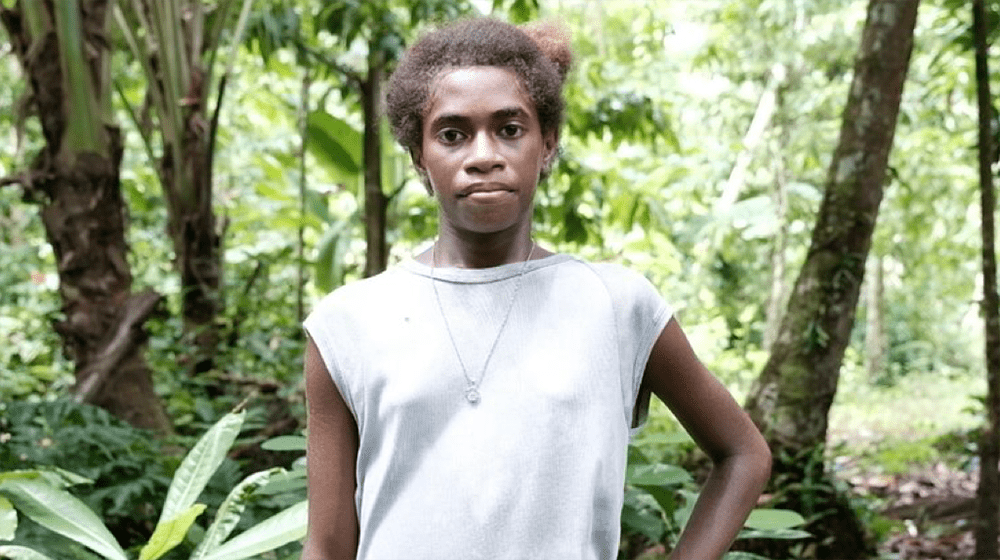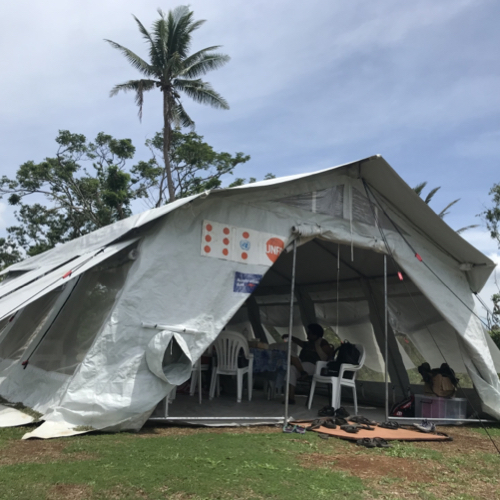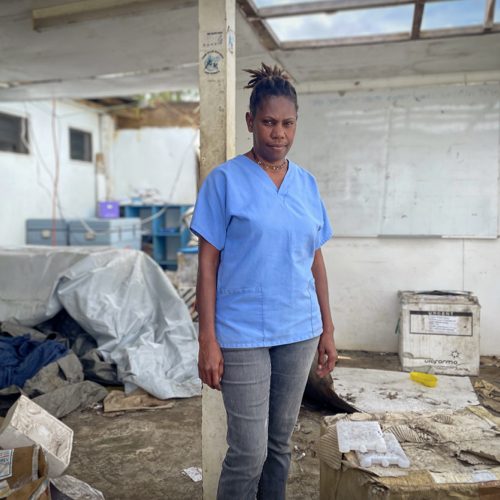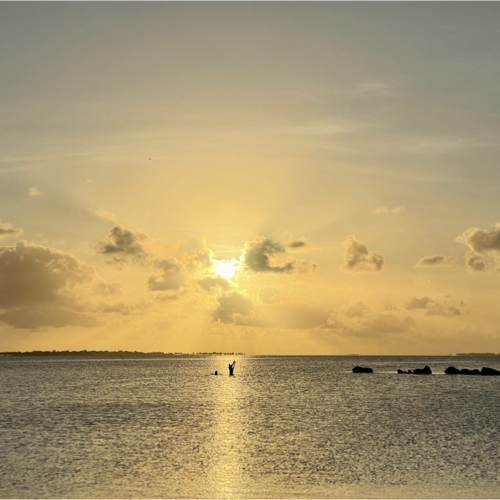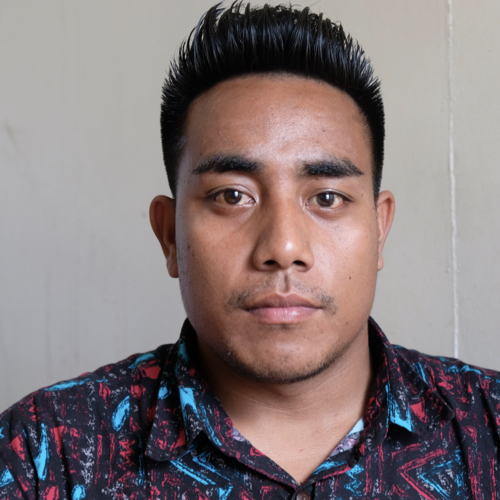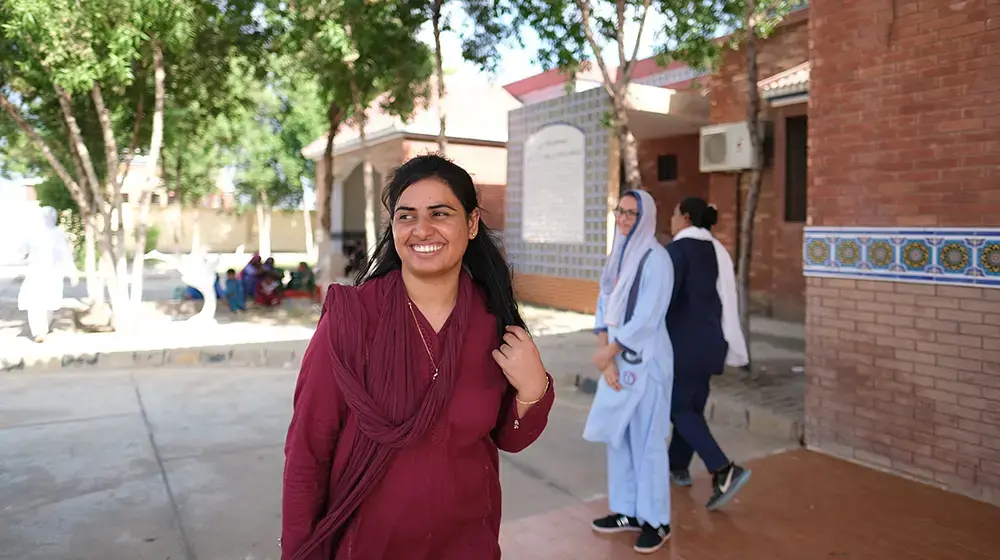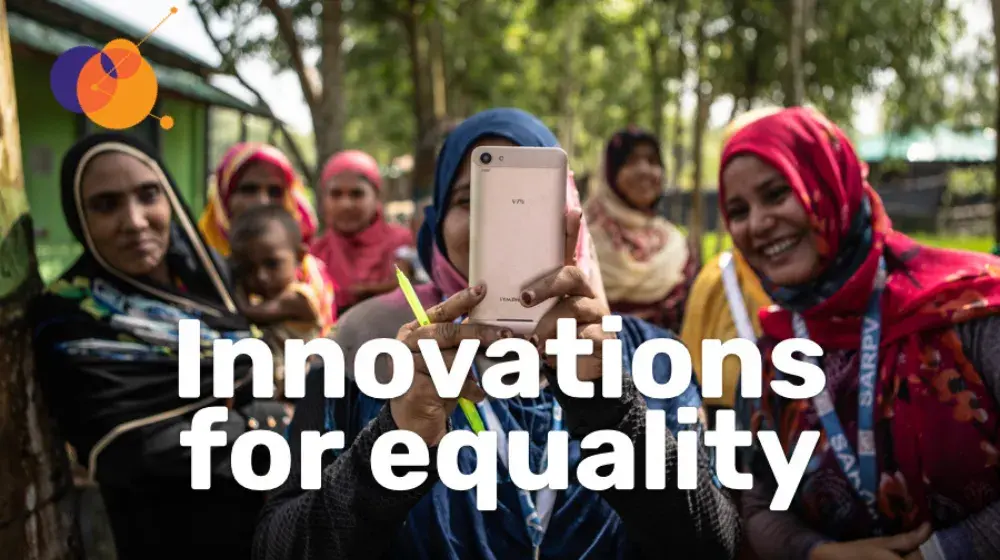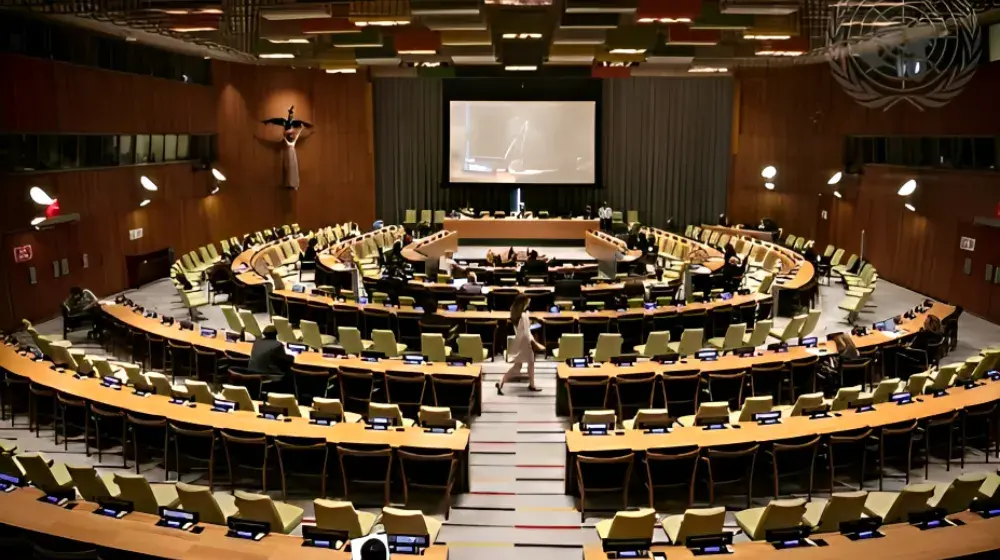As the world gathers in Dubai for COP28, the destruction from Cyclone Lola last month in Vanuatu is a brutal reminder of the intensification of climate disasters. It is the third major cyclone to hit the Pacific country in just six months. Each storm has triggered a response to help marginalised communities maintain their dignity during disasters. As part of UNFPA‘s sustained advocacy campaign, we feel it’s critical to showcase the voices of our partners in the Pacific coping with the impacts of climate disasters.
This collection of portraits presents the diversity of UNFPA’s response to climate disasters in the Pacific. UNFPA works with retired midwives, young people on remote atolls, the LGBTQI+ community, women leaders, persons with disabilities and government officials to uphold the fundamental rights and dignity of marginalised groups, before and after disasters hit. The climate crisis is about much more than numbers, it is about the people and communities coping with the consequences of extreme storms, droughts, floods, food insecurity and displacement. UNFPA stands in solidarity with the Pacific communities facing climate change, and we hope that climate action can be scaled up so even the most remote islands can prepare for the impacts of coming disasters.
Fiji
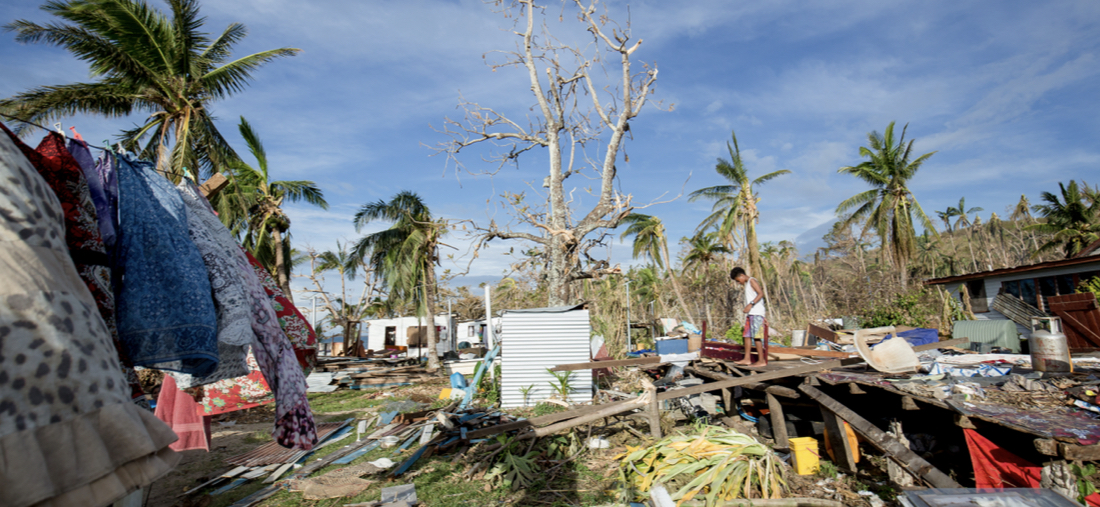
Tropical Cyclone Yasa made landfall on Fiji's main islands of Viti Levu and Vanua Levu as a Category 5 cyclone on 17 December 2020. Four lives were lost as a result of the cyclone. Cyclone Yasa caused flooding and damage to buildings and crops on Vanua Levu, with schools and houses destroyed as residents took shelter in public facilities. There was also severe disruption to electrical power supplies and communication services. During the height of the storm, the Fijian Government reported that over 23,000 people were sheltering in over 450 evacuation centres around Fiji. ©UNFPA Pacific
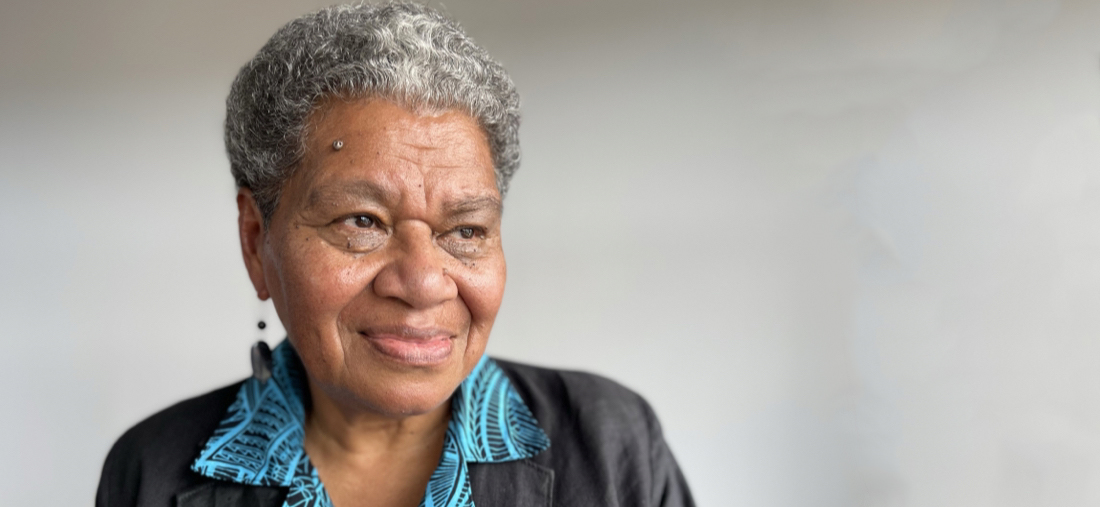
Litia Naralulu is a retired Fijian midwife who has gone through multiple climate disasters. When emergencies strike, women and girls are most at-risk. Pregnancy-related deaths and unwanted pregnancies increase as essential sexual and reproductive health services become disrupted. Emergencies can also increase the risk of multiple forms of gender based violence. UNFPA’s humanitarian response moves quickly to protect the health and protection needs of communities in crisis. This includes maintaining a roster of retired midwives from the region trained for humanitarian response who can be quickly mobilised to reinforce the health workforce and strengthen lifesaving sexual and reproductive health (SRH) services. Litia worked in Vanuatu after Cyclone Pam devastated the country in 2015 and she helped mothers give birth in Labasa following cyclone Yasa in Fiji in 2020. She keeps her skills up to date with regular training on best practices in humanitarian settings. She says the hardest part is helping women and girls after the disaster. “When women live in tents, there’s no privacy. It's an open public place they have to make do with one toilet and a bathroom for safety reasons. You have to be careful, especially mothers with young children who have to be careful where they are. There’s a vulnerability because there’s no privacy, and that impacts their dignity to do their daily things in a private place and safe place.” ©UNFPA/Rose
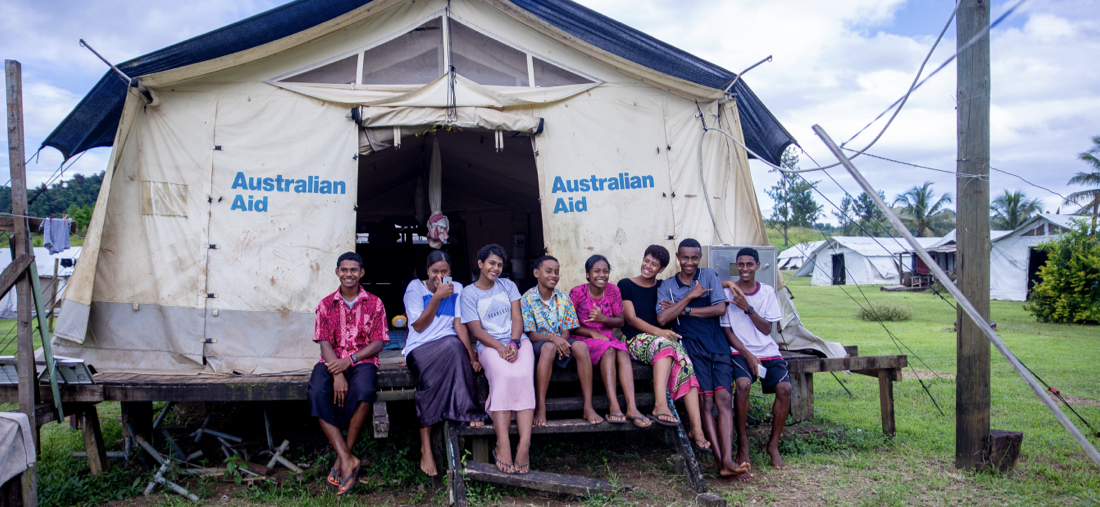
Tropical Cyclones Yasa hit the island of Vanua Levu, northern Fiji, destroying homes and livelihoods at a large scale. Almost 3 years later since Cyclones Yasa and Ana, over 55 other families from Nabavatu Village in Vanua Levu - still live in the tented temporary housing site, not too far from their original village. While the tents provide a roof over the families heads, the wooden floors often get flooded when the rains pour, and during the day, the heat inside the tent becomes unbearable.
UNFPA responded to the humanitarian crisis caused by the two consecutive cyclones by distributing ‘Dignity Kits’ to women and girls, and setting up a total of 12 Women Friendly Spaces in the affected areas, managed by 23 retired midwives, in collaboration with the Northern Division health teams, Community Health Workers, local communities and civil society organisations, and with the support of Australia’s Department of Foreign Affairs and Trade. ©UNFPA/Shiri Ram
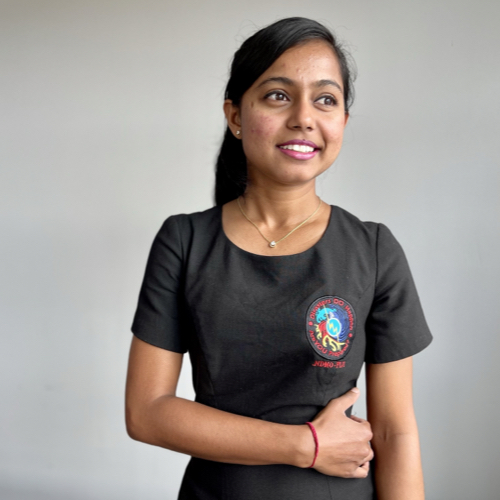 |
Prishika Nadan is a Humanitarian coordinator with the National Disaster Management Office in Fiji. Part of her role is coordinating the influx of support after disasters and the recent experience with Cyclone Yasa in 2020 demonstrated the benefit of better preparedness. “We are trying to be more proactive instead of reactive,” she says. Prishika says as a woman humanitarian practitioner she gets the opportunity to influence policies to more fully consider women and people with disabilities. “You get a chance to add that lens to decision-makers to help them make decisions that are more holistic. Being a woman brings an awareness of issues that might have been missed out if only men decided.” ©UNFPA/Rose |
| Without adequate clothing, menstrual supplies and hygiene items, women and girls may be unable to access basic services, including humanitarian aid. That’s why UNFPA Pacific developed the Menstrual Hygiene Management Kit to help adolescent girls manage their menstruation safely and with dignity even during and after emergencies. WATCH THE VIDEO | 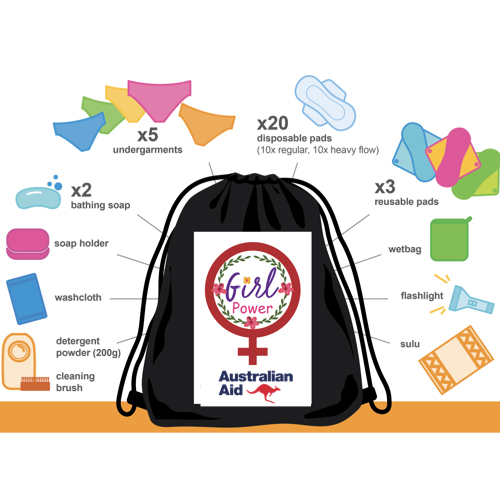 |
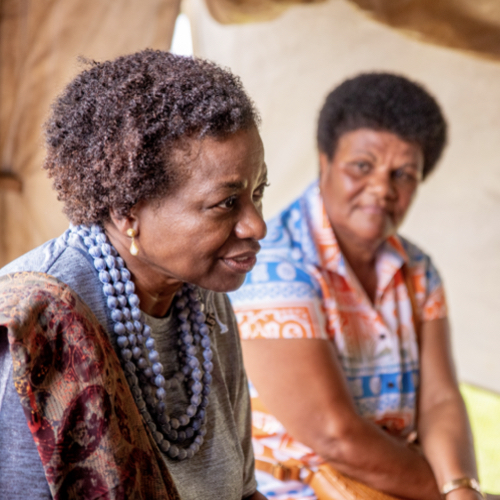 |
UNFPA Executive Director, Dr. Natalia Kanem, met with women from the Nabavatu community in Fiji, which was struck by the category five tropical cyclone Yasa in 2020. The cyclone left families homeless and without livelihoods. During the interaction, the women described in vivid detail the devastating impacts of the disaster on their health and dignity. ©UNFPA/Shiri Ram
|
“As we work with communities to build resilience to the effects of climate change, it is crucial that we listen to women and young people, prioritize their needs, and include them in policy making and humanitarian action.”Dr Natalia Kanem |
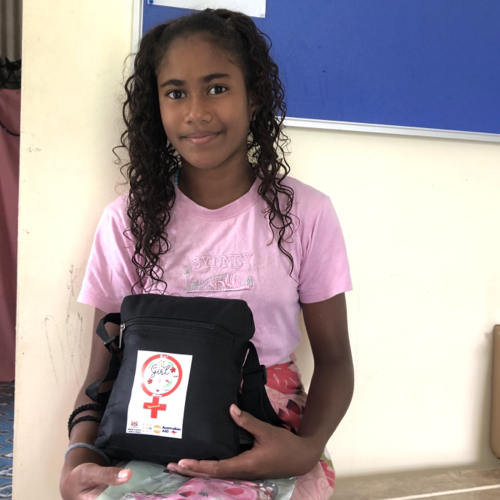 |
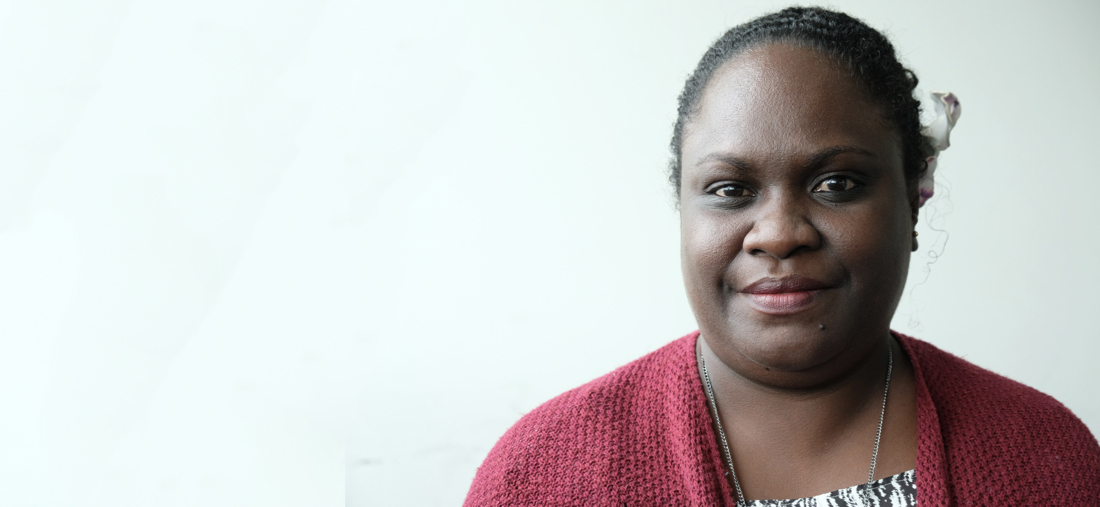
Solomon Islands: Zamira Rua is a Protection officer with the Ministry of Women, Youth, Children and Family Affairs in Solomon Islands. “My role is to coordinate protection in disasters. It’s not only when a disaster happens, we’re looking at preparedness, response and recovery.”
“There are gaps and challenges for women and girls and people with disabilities,” she says. “The scale of resources that we have compared to the vast population and vulnerable groups, it’s a challenge that we encounter especially in emergencies.”
Zamira says gender-based violence is a big problem in Solomon Islands and climate disasters only increase the conditions for violence. “We need to improve referral pathways. Support for gender-based violence in emergencies needs to be strengthened and better coordinated. Women need to know their rights and know that they can seek safety in an emergency.”
“We need to consider the damage that the disaster causes in the community, women and girls and pregnant mothers will have to seek access to sexual and reproductive health services within the evacuation centres when there’s no proper lighting when there’s no access to sanitation and security, definitely violence can happen to women and girls. This is one of the reasons why there is an increase in emergencies.” ©UNFPA/Rose
Vanuatu
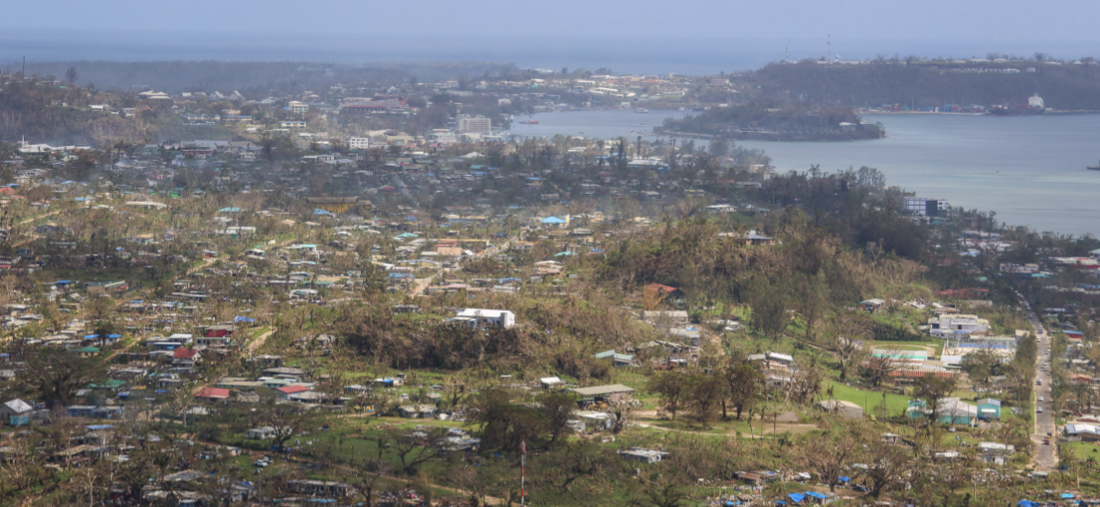
Severe Tropical Cyclones Judy and Kevin were a pair of intense tropical cyclones that made landfall on Vanuatu within 48 hours of each other in March 2023. 130,000 people were impacted by the storms that destroyed homes and water systems throughout the country. More than 45,000 women and girls of reproductive age were directly affected by the disasters. ©UNFPA Pacific
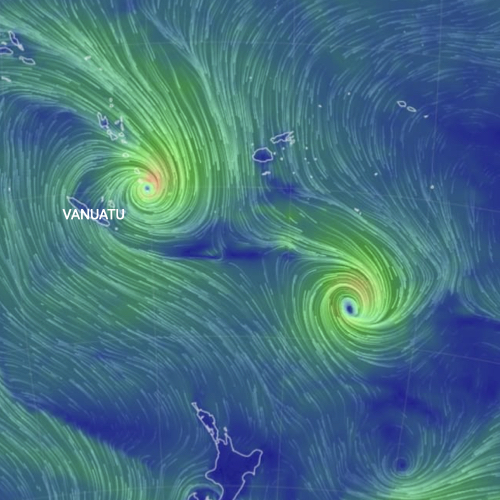 |
|
|
|
The Women and Girls Friendly Space acts as vital entry points, providing comprehensive assistance in areas such as sexual and reproductive health, maternal health , and addressing gender-based violence. Additionally, these spaces are also referral points where women and girls can access resources and support to enhance their personal empowerment, foster social connections, and facilitate their integration into community life. ©UNFPA/David Palazón |
| Seven retired midwives delivered sexual and reproductive health services and addressed gender-based violence in both Port Vila and Tanna Island. UNFPA established three Women and Girls Friendly Spaces in Central, Southwest, and West Tanna. These spaces became havens of support and encouragement, offering women and girls a safe environment where they could share their stories and receive the assistance they needed. ©UNFPA/David Palazón | 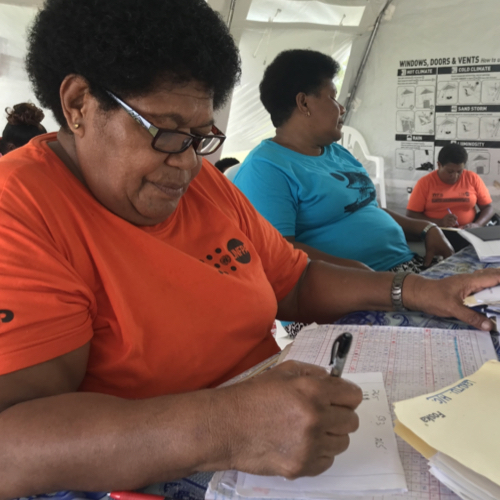 |
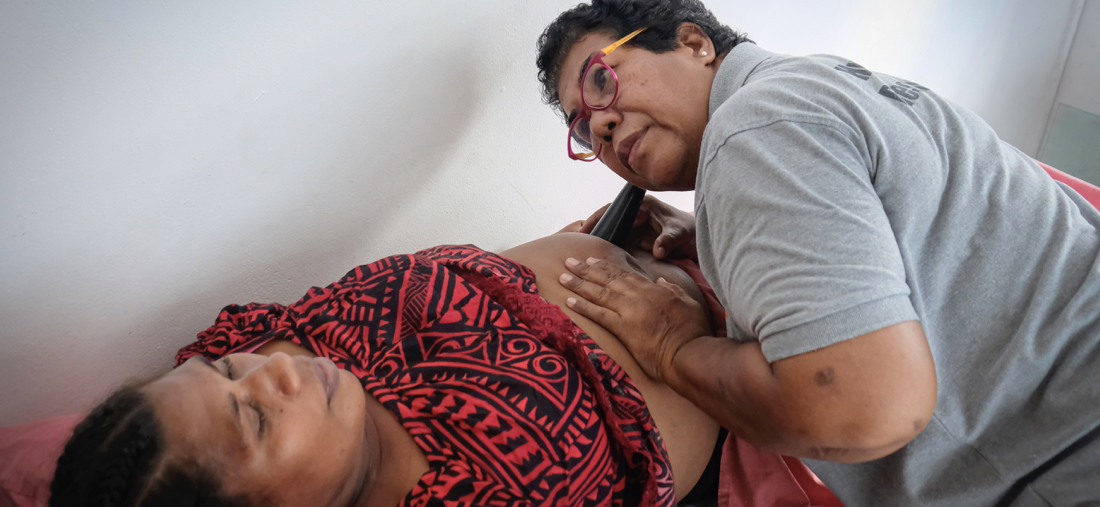
Midwife Kinisena Bolalevu is a retired midwife from Fiji who is part of the response to the recent disasters in Vanuatu. Kinisena sees around 80 patients a day to provide care. She also mentors young nurses. Familial pressures,fears of potential domestic violence, and discussions about family planning can be challenging, sometimes even drawing blame towards healthcare workers. In reflecting on her work, Kinisena shares, "It's a delicate balance, often fraught with fear. Many wives do not disclose their family planning methods to their husbands because they fear gender-based violence. And many times, these cases of violence remain unreported. Once, a policewoman confided in me at the clinic that health workers are often seen as culprits in these instances. It's a heartbreaking reality, but we strive to navigate these complexities, ensuring women's safety and rights are protected. The clinic stands as a beacon of support for women navigating these complexities.” ©UNFPA/David Palazón
|
“The government needs to strengthen early warning systems, because in Vanuatu they set up sirens, but for those who are deaf, how will they know if the siren is on?” says Nelly Caleb. She is the national coordinator of the Vanuatu Disability Promotion and Advocacy Association. “We told them this is not inclusive and also the network coverage doesn't reach all the islands in Vanuatu.” “Our network of people with disabilities who try to reach our office have to go out in the ocean just to get a phone signal. But what happens when there are rough seas? Some of our members had to climb the trees to access cell phone signals,” she says. “There needs to be network coverage so that people with disabilities, even those who are deaf, can access text messages that are coming through for the early warning systems.” ©UNFPA/Rose VIDEO |
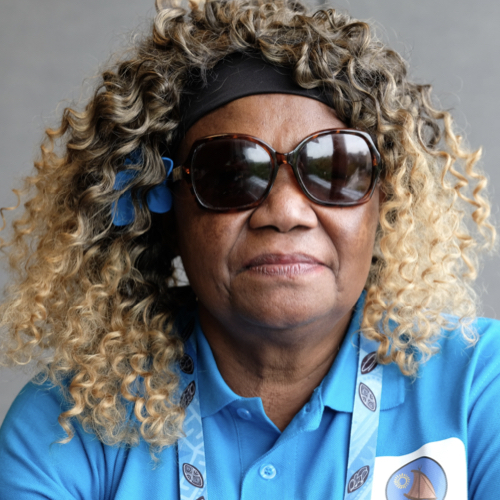 |
|
|
Amid the cyclone's aftermath, health workers like Sarah Maia, a midwife at the maternal and child clinic in Lenakel Hospital, faced immense challenges. With clinic rooms damaged and facilities compromised, providing postnatal care has become a struggle. Sarah explains, "The cyclone damaged several rooms in the clinic, leaving us with inadequate facilities for postnatal care." The cyclone's impact has led to a rise in respiratory infections and child malnutrition. Sarah, who is a mother of two emphasizes the heightened vulnerability of women to sexual abuse in the aftermath of the cyclone. Data shows that violence against women is a pressing issue in Vanuatu. A 2017 report by the Vanuatu Women's Centre found that 60% of women in Vanuatu have experienced physical or sexual violence, with one in three girls under fifteen experiencing sexual abuse. ©UNFPA/David Palazón |
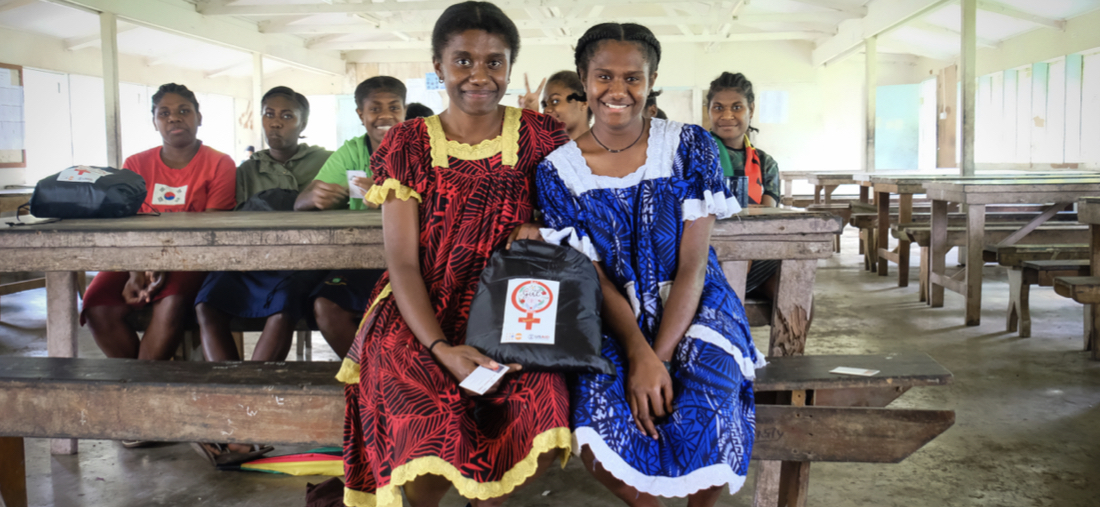
At any given emergency, an estimated 26% of the affected population are women of reproductive age. Populations affected by hazards and disasters face many challenges and access to sanitary items that allow women and girls to manage menstrual hygiene safely, effectively, and with dignity is one of them. UNFPA Pacific adopted the global standard of Menstrual Hygiene Kit to the Pacific context through research and community consultations in April 2021. The kit was designed to supplement the existing Pacific customised Dignity Kit and Women with Disability Dignity Kits, providing culturally appropriate menstrual hygiene supplies and relevant supplies for at least 3 months. ©UNFPA/David Palazón
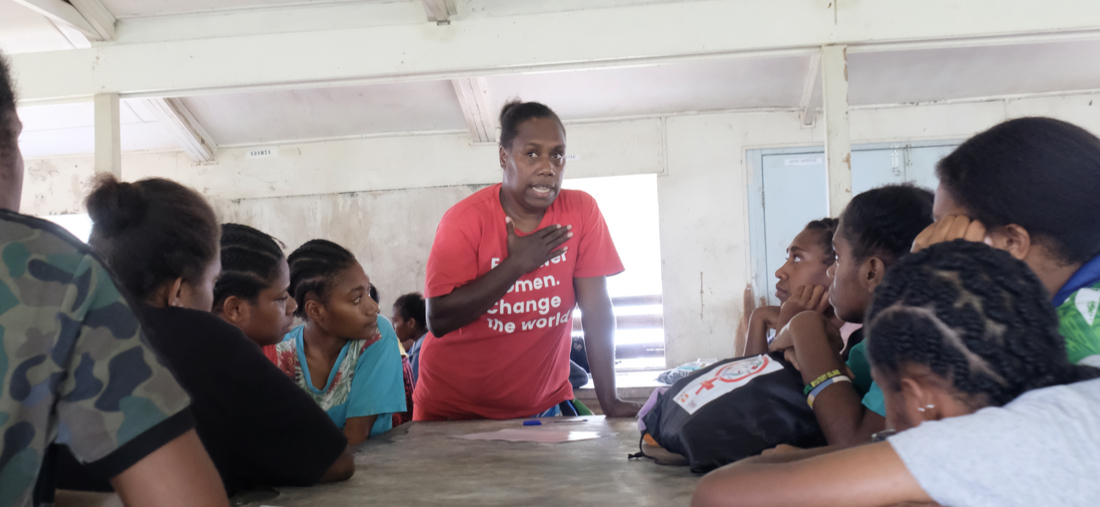
Lizzie Molli, Livelihood Coordinator at ActionAid, plays a vital role as a member of the women-led response team in Vanuatu. In this photograph, she leads an empowering awareness session in Yopuna village, Epi Island. “Empowering women in Vanuatu, particularly in emergency situations, is my driving passion,” Lizzie, the ActionAid Livelihood Coordinator expressed. Alongside the kits, awareness sessions were conducted by Lizzie Molli, the ActionAid livelihood coordinator, covering critical topics such menstrual health, sexual reproductive health, and gender based violence. Phone cards with free-toll numbers for further support were also distributed, equipping participants with knowledge and tools to protect their health and well-being and access critical information. ©UNFPA/David Palazón
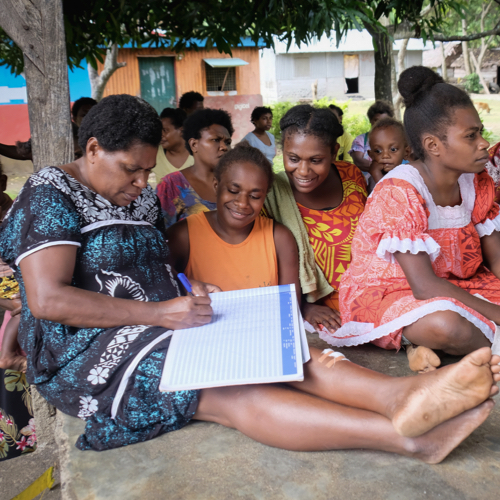 |
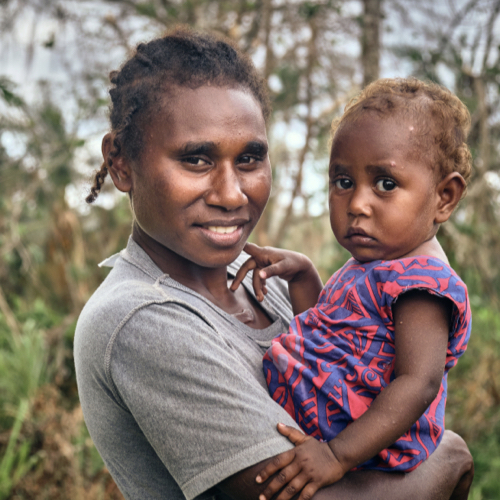 |
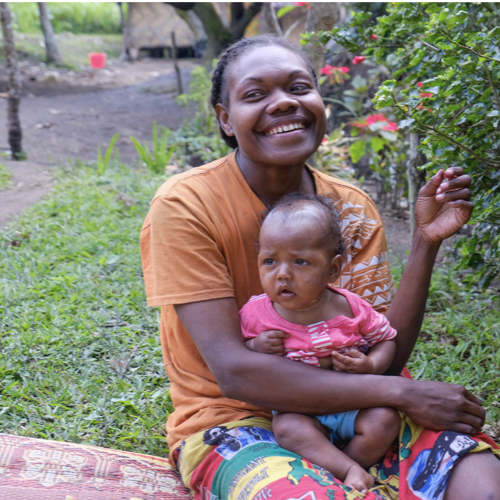 |
“The most useful service is talking about menstruation and menstrual hygiene to young girls, even us women and also talking about family planning."
-Sally Erickson, Vanuatu
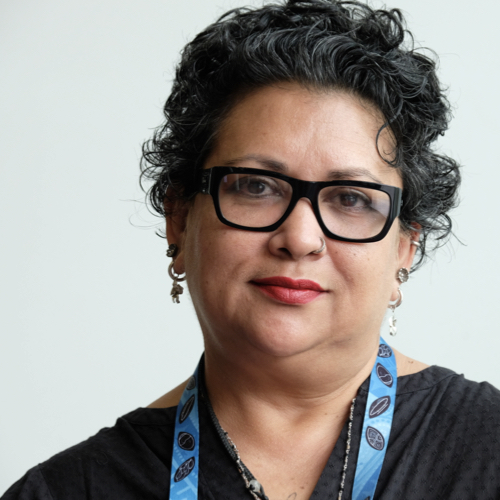 |
“It starts with sitting on the mat with a group of rural women to understand what their needs are and what they expect from the disaster management system.”Sharon Bhagwan-Rolls |
|
“The women's agenda, in all our diversity, is not just limited to one silo in the humanitarian system,” says Sharon Bhagwan-Rolls. She is a second-generation Fiji Island feminist working on the intersection of gender, media, communications and peace by supporting the development and production of appropriate and accessible media. “If we are not being inclusive from the start from early warning and preparedness, you are certainly not going to have an inclusive response.” The Shifting the Power Coalition came together in the wake of tropical cyclones Pam and Winston in 2015 and 2016. It has shown how women’s leadership can be supported in all stages of disaster risk reduction including early warning and preparedness, redesigning systems and structures. “It starts with sitting on the mat with a group of rural women to understand what their needs are and what they expect from the disaster management system,” she says. “Then being able to connect them to information communication technology, that is the model that we are using with Shifting the Power.” It is about women leading from early warning to resilience building. “We are showing that women can innovate, Pacific women are able to innovate using our own content,” Sharon says. “It does not mean somebody coming in from the global north or another country to say, this is what you need. We have designed it and co-created it and we are continuing to build on it.” ©UNFPA/Rose |
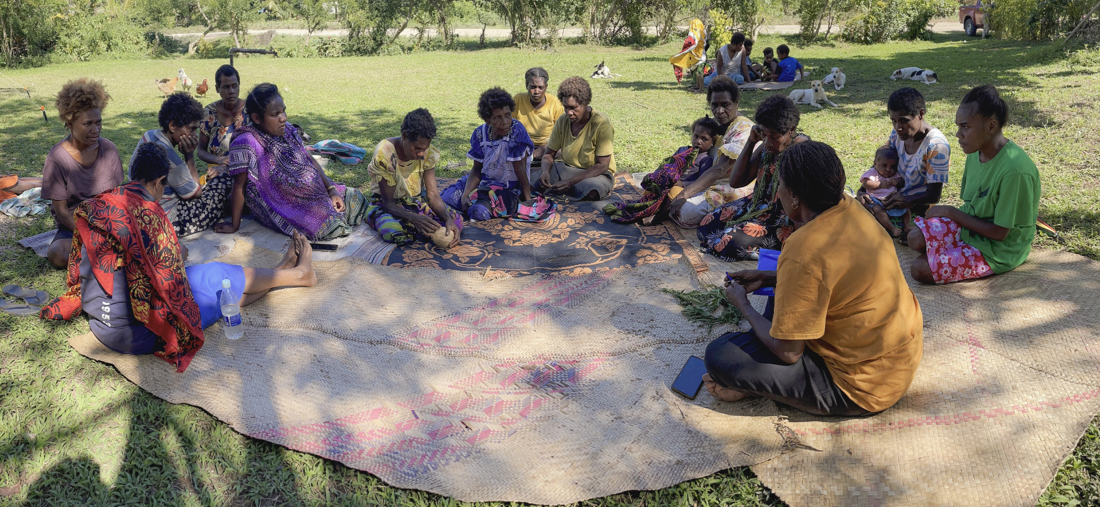
Vanuatu: The Lounoula Ita-ita Women Group is a driving force in their community, promoting financial literacy and empowerment among young girls. They prioritise savings for personal hygiene and menstrual products, empowering girls to care for their own well-being. They support pregnant women by covering transport expenses and access to healthcare services. Reflecting on their resilience, one member of the Lounoula Ita-ita Women Group shared her strategy, stating, "In advance of the cyclone season, I use my personal savings to stock up on basic supplies to sustain my family during the emergency because I know food will be scarce after the storm." ©UNFPA/David Palazón
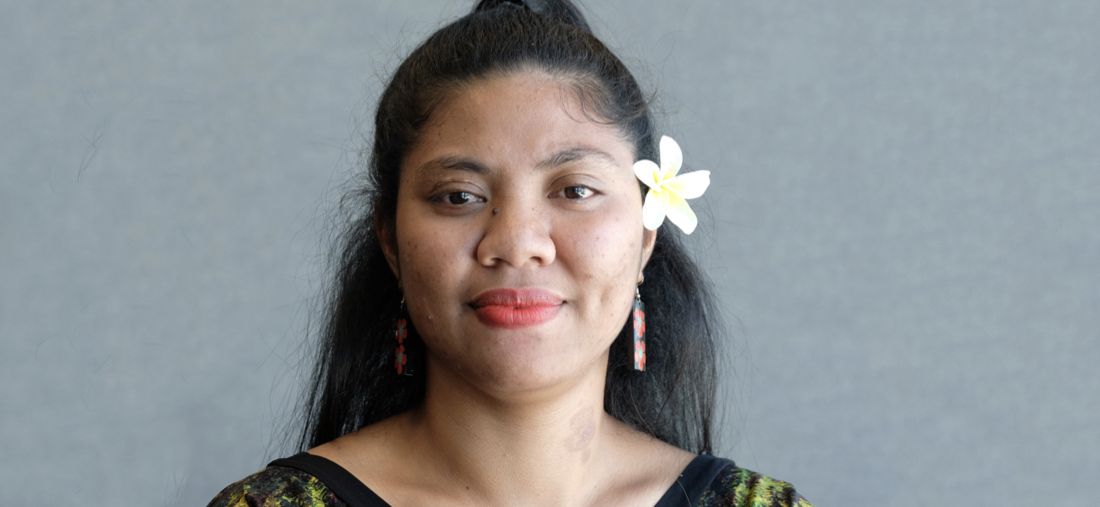
Samoa: Maselina Iuta Fiso leads advocacy campaigns with the Deaf Association of Samoa, engaging the Ministry of the Prime Minister and Cabinet, the Samoa Meteorological Services,, the National Disaster Management Office, etc. to ensure that the special needs of persons who are deaf and hard of hearing are prioritised in disaster preparedness and response.
“My role is to advocate for the rights of people with disabilities and work with the deaf community in Samoa to ensure that they are able to participate in all aspects of society” Maselina says. “We do a lot of work with deaf people in rural areas. We are trying to learn better ways to address the specific barriers they experience, and advocate at community and national level for the realisation of their rights as guided by the Convention on the Rights of Persons with Disabilities.”
Maselina was just a girl when a tsunami hit Samoa in 2009. Without prior discussion about disasters or what a tsunami even was, the evacuation with her family was a terrifying experience. She now works to ensure early warning systems reach people with all types of disabilities, so as the climate crisis intensifies for Samoa, the most at risk will be prepared. ©UNFPA/Rose VIDEO
|
|
|
Kiribati: Kaaukau Tebarea leads the youth engagement organisation Y-PEER in Kiribati. Y-PEER is a key partner for UNFPA to reach young people in the atoll nation that is struggling with the impacts of climate change and a severe drought that has intensified food scarcity and economic stress. Through discussions with boys around Kiribati, Kaaukau talks about their dreams, their lives and complex issues like inherited norms of violence. “We talk to them and listen to what they are going through,” he says. “Some boys I spoke with were without hope. With a positive mentor they have found a way to make an impact. All youth issues from teenage pregnancy to gender-based violence are connected to climate change.” ©UNFPA/Rose
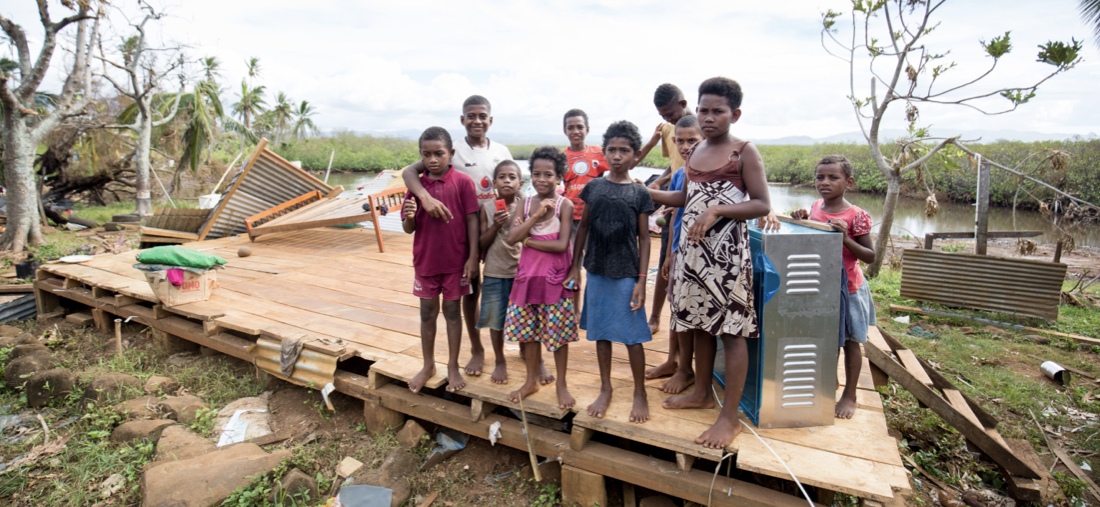
Fiji: Children stand in the remains of their home follwing the destruction of Tropical Cyclone Yasa. ©UNFPA Pacific
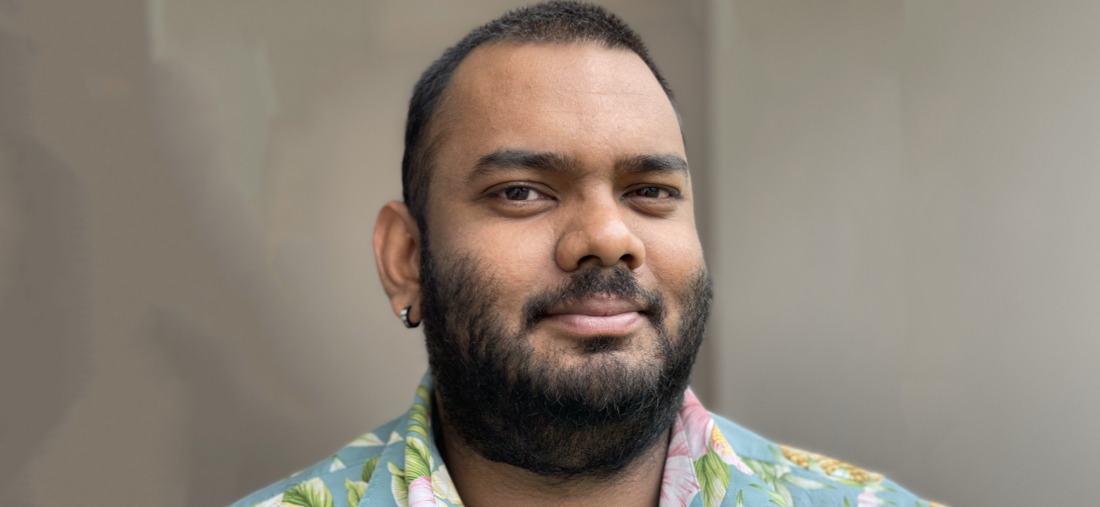
Abdul Mufeez Shaheed is a Programme Manager with Rainbow Pride Foundation in Fiji. He works on projects related to climate justice and socio-economic empowerment for the LGBTQI+ community. “Whenever there is a natural disaster, social media erupts with hatred towards my community. There used to be acceptance of a third gender in the Pacific, before colonisation and introduction of Victorian laws. Religious leaders constantly berate the LGBTQI people, which causes tension in communities, and sometimes results in physical and verbal abuse. It’s a vicious cycle.”
Abdul says gender-based violence for his community in evacuation shelters is widespread. “There was a group of trans women who were living together and when the cyclone came, the community moved into the evacuation centre, but this group of women decided to remain in their house because evacuation centres are divided by men and women and trans people are put with the men. There are requests for sexual favours, harassment, abuse. People think about whether they are safe in evacuation centres or whether they’re safe or in their home. Here I know how to protect myself, but there are no places to hide in a single room.”
UNFPA is working with Rainbow Pride Foundation developing a dignity kit to address the needs of LGBTQI+ individuals in evacuation shelters or post cyclones in their homes. “We’ve done the first phase, a survey from our network to understand what their needs look like. The next stage will be to prioritise and discuss what UNFPA is able to provide. The plan is to put that in action as a pilot next time we are faced with a natural disaster. That would be a first for the region.” ©UNFPA/Rose
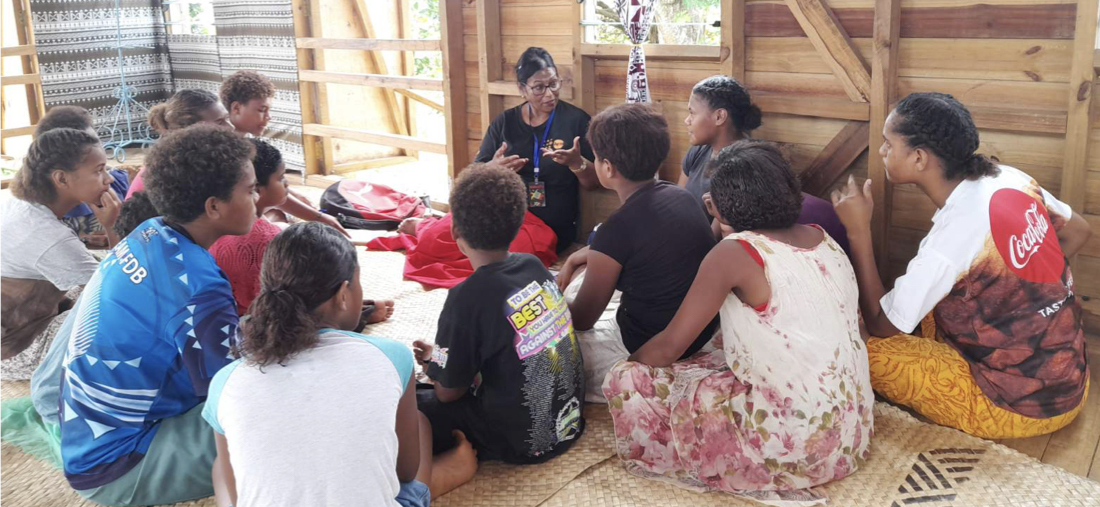
Sister Hem Lata is a Fijian retired midwife who was deployed to Vanua Levu Fiji to support the response for Tropical Cyclones Yasa and Ana in 2021. She was stationed at the Savusavu Women Friendly Spaces with three other retired midwives to provide essential sexual reproductive health and gender-based violence information and services. Sister Hem Lata conudcted outreach sessions, delivering information awareness sessions to adolescent girls on menstrual hygiene and management as part of the distribution of Menstrual Hygiene Kits. ©UNFPA Pacific
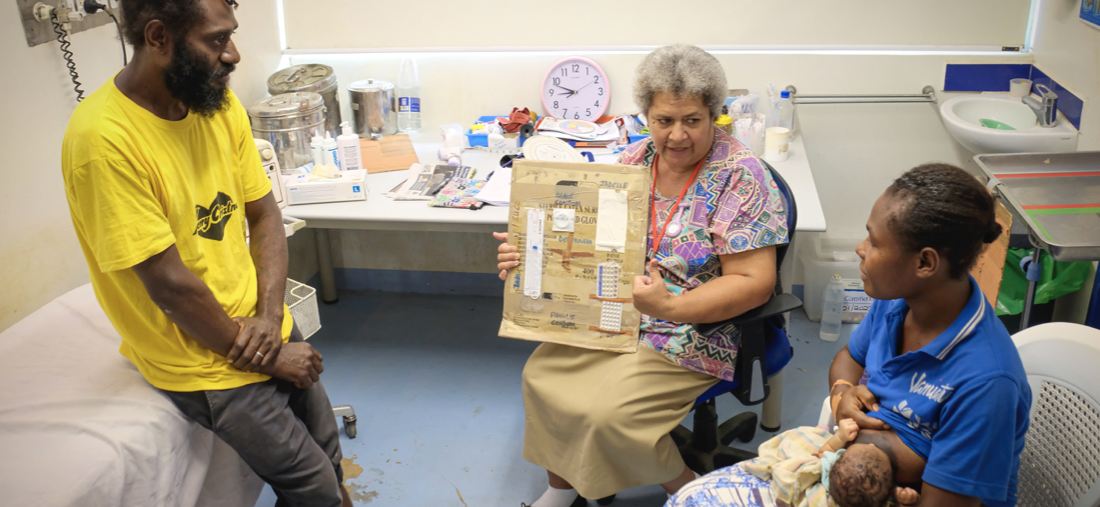
Vanuatu: With their third baby recently welcomed, a couple discusses family planning options with Fijian midwife Emily Q. Naiceu who was deployed to Vanuatu following cyclones Judy and Kevin and to help fill the gap in sexual and reproductive health services. This embodies the efforts to meet the growing demand for modern family planning methods in Vanuatu, where 61% of the need was satisfied in 2022. ©UNFPA/David Palazón
“We are living in a new reality right now.Extreme weather events are happening in the Pacific and around the world that are intensified by climate change.”-Ana Maria Leal, UNFPA Pacific |
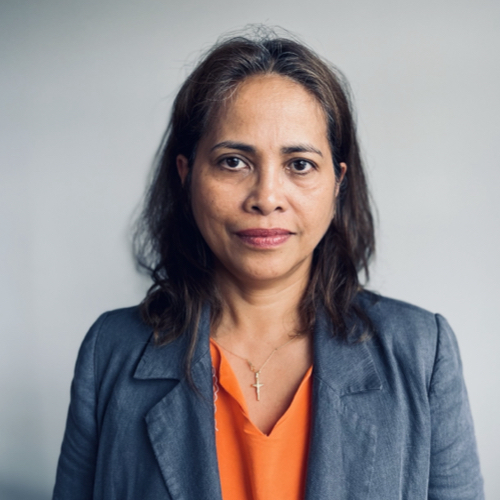 |
|
Ana Maria Leal is a Humanitarian Coordinator with UNFPA Pacific. She has been involved in dozens of responses to disasters on the frontline of climate change. “We have strengthened the capacity of the health system in the Pacific to think about the continuation of care that women and girls need from pre crisis to crisis and post crisis period,” says Ana. “We are living in a new reality right now. Extreme weather events are happening in the Pacific and around the world that are intensified by climate change. For us working on humanitarian and action, we are trying to help the government perform lifesaving work for their constituents. We need to prioritise sexual and reproductive health. Two thirds of maternal deaths happen in humanitarian contexts. Our mandate is securing the safety of women and girls in a crisis.” ©UNFPA/Rose |
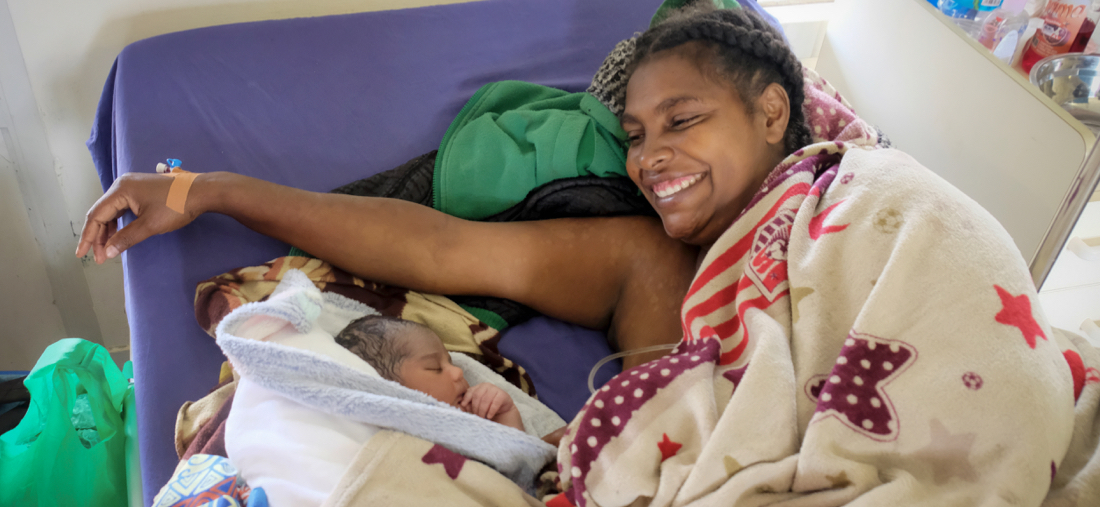
Vanuatu: A mother and her newborn baby in the post-natal ward at Lenakel Hospital, Tanna Island. ©UNFPA/David Palazón
Learn more
Minimum Initial Service Package - The minimum, life-saving sexual and reproductive health needs that humanitarians must address at onset of an emergency
GBV Area of Responsibility brings together non-governmental organisations, UN agencies, academics and others under the shared objective of ensuring life-saving, predictable, accountable and effective GBV prevention, risk mitigation and response in emergencies, both natural disaster and conflict-related humanitarian contexts)

